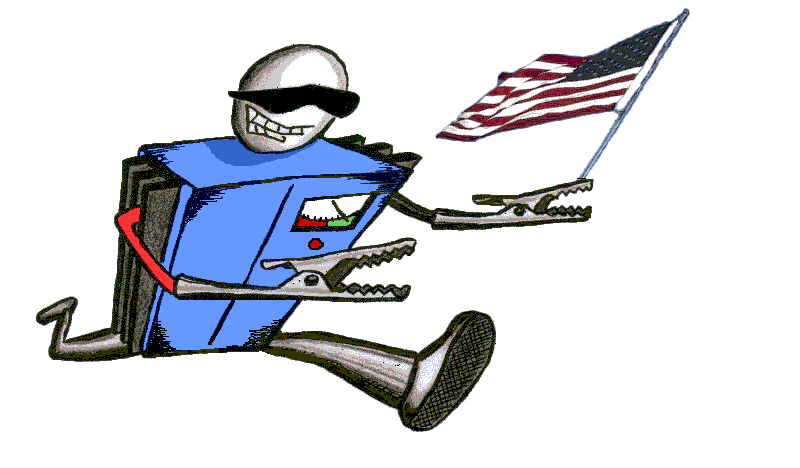Chargingchargers.com
Industrial Quality at Affordable Pricing
 |
LIVE ORDER & TECH LINES: 7:30 AM TO 4:00 PM PACIFIC TIME M – F NO SALES TAX
Toll Free Order Line Only: (877) 405-0978 Monday – Friday Tech & Order Line: (541) 582-4629 Monday – Friday ORDER ONLINE ANYTIME Email Tech Questions: info@chargingchargers.com Fresh, New Stock. No Used or Reconditioned, at the Best Price! WE NOW ACCEPT PAYPAL! |
View Cart
|
| TUTORIALS | ABOUT US | BRANDS |
| BATTERY CHARGERS | INVERTERS | DC CONVERTERS | SOLAR CHARGERS | SEALED BATTERIES | BATTERY DESULFATION |
Self Reliance - Water
Water production, storage, and filtration if necessary, is a very important topic for self reliance. You know the adage - 3 minutes without air, 3 days without water, 3 weeks without food (I know, shorter and longer estimates abound). So, one of the first things that becomes critical in a self reliant situation is a water source, or storage supply. The quantity or method chosen varies with the expected duration you want to allow for. Enough for a few days can be stored in bottles or barrels made for the purpose, treated with chlorine (2 drops per quart, 8 drops per gallon, 1/2 teaspoon for 5 gallon). You can open the container and let it sit for several hours to disipate most of the chlorine smell/taste. We sometimes keep a few 2 liter soft drink bottles cleaned and filled with water during the storm season, as this buys some time to see how long we may need to provide for. These are not long term storage bottles. If you live near a lake, creek or river, storage may not be that critical, but filtration/purification is. Water from this type of source should be filtered with a good water filtration device, down to around .2 micron, or can be distilled, or at least boiled. Bottom line is, preparation needs to be done for your circumstance.
Production
Production may seem like a peculiar term, but that is what municipal utilities call it. Water can be produced from lakes, rivers, wells, desalinating sea water, cisterns, etc. In cities, it may be stored in reservoirs, generally elevated, or storage tanks, etc., and some of the system gravity feeds from this supply. Some of the system will have pumping plants to maintain the system pressure - the higher you are, the more this applies. Highrise buildings have their own pump systems. This is all subject to power for pumps, and system integrity, i.e. an earthquake or such can rupture a water main and there goes your pressure. Conclusion: municipal water supply is not reliable in disasters, calamity, etc., not to mention it can just be shut off.
If you intend on gathering water from a nearby source, you need something to transport it in (preparation). A lot of the rural population (the majority of the country, geographically) use wells for water. We are not talking about a rope and a bucket, though some people think that's exactly what you mean. They are usually a four or six inch steel casing down a bored hole into a reliable aquifer. The pump may be a submersible, with a single pipe, or a jet pump that sits at the suface with two pipes down the well, or even a hand pump in combination with a submersible, if the water table isn't below about 25 feet. They produce naturally filtered water. If you have such a setup on your property, consider yourself lucky (except at the times you need to maintain it, like pulling 60 feet of 1 1/4 inch and 1 inch PVC pipe out of the ground, when the tubes are full of water). You can get a generator, and wire the well house with a quick connect, so you can just hook the well to the generator if power goes out, and be able to shower, fill containers etc., while rationing the generator run time. This involves fuel storage, so see that section as well. You can also mount your own elevated storage tank (doesn't have to be that big), to use gravity feed when the system isn't pressurized. If you have no generator or no fuel, and you can pull the pump piping, you can lower a piece of PVC with a flapper in the bottom and pull out a gallon or two at a time. Not particularly efficient, but you won't die of thirst (if you are prepared).
Trying to run a well from a battery bank (which may or may not be solar charged) and an inverter, can be done, but a lot of wells are 230 VAC input, and 3/4 to 1 1/2 horsepower. Appropriately sized equipment would be in order. There are purpose built 12 and 24 volt submersible DC pumps (Shurflo™ and Grundfos™ to mention two) that can be used with a DC system, usually solar powered. These will usually be of less flow and pressure than the standard 230 VAC well pump, but can be totally acceptable to run a system with solar power. Usually these are used with a storage tank that may have a higher pressure pump to maintain house pressure.
Storage
Storage can vary from 2 liter bottles, to gallon bottles, to drums, to tanks. You can consider a lake or river you live on storage. Water stored in bottles or drums or tanks should be chlorinated (see ratios above), if you don't know when it will be used, and emptied/refilled on a schedule. Bottles or drums used for long term storage should be food grade, UV stable of known origin. We don't subscribe to the 'use your water bed' philosophy. Rain water can be collected in cisterns for later use (roof runoff, etc.), but treatment/filtration would apply. This has been done for millennia, and is still done routinely in some areas of the world.
Filtration & Purification
Water pulled from lakes, rivers, streams, ponds, stored in cisterns, etc., should be filtered or distilled before consumption. There are excellent water filters, including straws, sports-type bottles, gravity feed, and pump setups, used for camping, exploration, disaster relief, etc. Some of the best are by Katadyn™. The ceramic units can be washed and reused. Having some sort of water filter in your 'just in case' bag never hurts. Distillation is an excellent method of producing clean water from questionable sources, if you have a heat source, or a solar distiller. And of course, there is the standby military type water purification tablet. Once again, preparation is key here.
Recommendations
Everybody needs some sort of filtration ability, as you never know what source you may end up with for water. If you live in a city, or depend on a municipal water supply, your own storage is more important than it might be in other circumstances. Keeping enough and rotating it is important. If you have access to a lake, river, creek, etc., filtration and transportation become important. If you have a well, having power to operate the pump (or a total solar system in advance), or a hand pump for a shallow well, or a solar conversion to install, or a hand bail setup should be put together.


